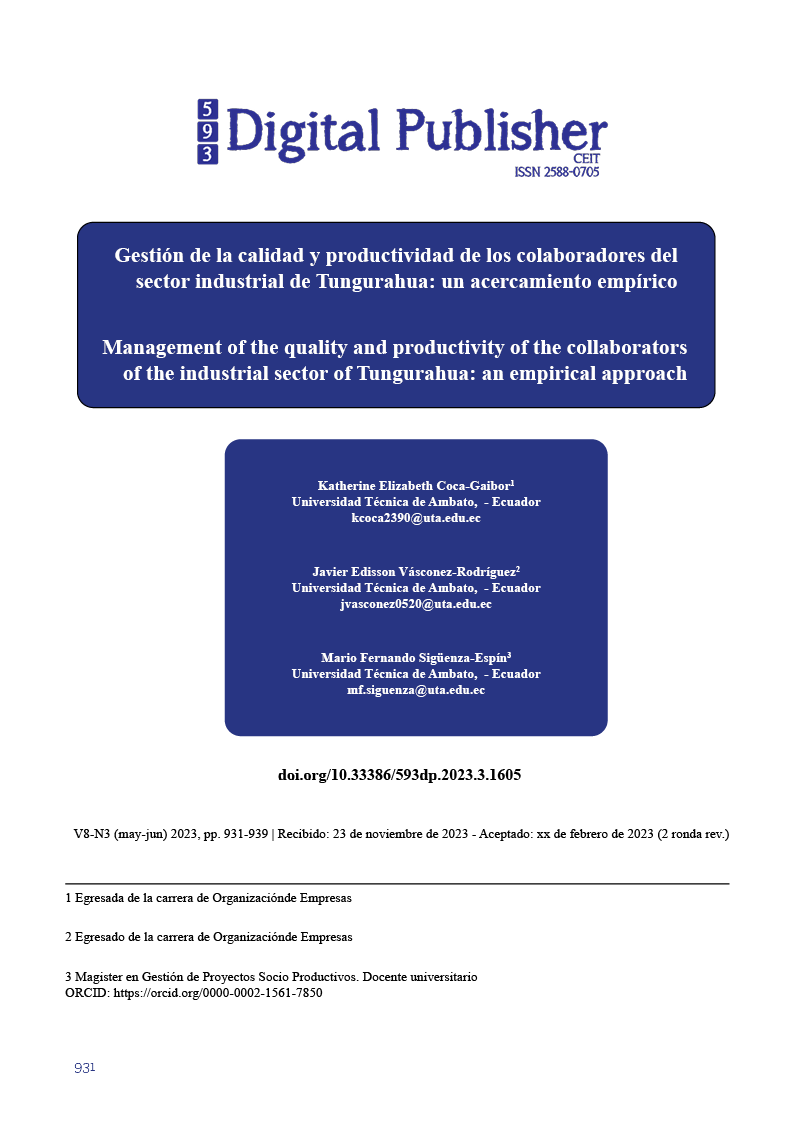Management of the quality and productivity of the collaborators of the industrial sector of Tungurahua: an empirical approach
Main Article Content
Abstract
The purpose of this work was to examine the impact of total quality management (TQM) practices on attitudes related to employee productivity, such as job participation, job satisfaction, professional satisfaction, and organizational commitment of employees. of the industrial sector of Tungurahua. The paper proposes and tests 4 hypotheses about the relationship between KM practices and work-related attitude. The results indicate that training and education have a significant positive effect on labor participation, job satisfaction, and organizational commitment. Empowerment and teamwork significantly improve labor participation, job satisfaction, career satisfaction, and organizational commitment. Continuous improvement and problem prevention significantly improve job satisfaction and organizational commitment. Customer focus does not contribute to job engagement, job satisfaction, career satisfaction, or organizational commitment. The study was unable to assess the broader dimensions of CG practices. It is concluded that, managers should be aware that KM practices have a positive effect on employees' work-related attitudes (such as job participation, job satisfaction, job satisfaction, and organizational commitment).
Downloads
Article Details

This work is licensed under a Creative Commons Attribution-NonCommercial-ShareAlike 4.0 International License.
1. Derechos de autor
Las obras que se publican en 593 Digital Publisher CEIT están sujetas a los siguientes términos:
1.1. 593 Digital Publisher CEIT, conserva los derechos patrimoniales (copyright) de las obras publicadas, favorece y permite la reutilización de las mismas bajo la licencia Licencia Creative Commons 4.0 de Reconocimiento-NoComercial-CompartirIgual 4.0, por lo cual se pueden copiar, usar, difundir, transmitir y exponer públicamente, siempre que:
1.1.a. Se cite la autoría y fuente original de su publicación (revista, editorial, URL).
1.1.b. No se usen para fines comerciales u onerosos.
1.1.c. Se mencione la existencia y especificaciones de esta licencia de uso.
References
Alta, V. (2018). Principales Factores De Ausentismo Y Su Satisfacción Laboral Del Personal De Salud Del Departamento De Cirugia Del HNERM 2015.
Arana, E. (2006). Calidad competitiva. CienciaUAT, 1(2), 27–29.
Arraut, L. (2010). La gestión de calidad como innovación organizacional para la productividad en la empresa Quality Managemen as an Organizationa Innovation for th Productivity of th. Revista Escuela de Administración de Negocios, 69(2), 20–41. http://www.redalyc.org/pdf/206/20619966002.pdf
Calvo, S. (2013). Factores determinantes de la calidad percibida: influencia en la decisión de compra [Tesis Doctoral]. Universidad complutense de Madrid.
Canales, A., López, J., & Napán, A. (2021). Clima Organizacional y el Desempeño Laboral durante el Covid-19. Revista Arbitrada Interdisciplinaria KOINONIA, 6(1), 124–142.
Cortés, C., Tarverner, Ll., & Azorín, M. (2018). Recursos de la empresa y pertenencia a un sector industrial: un estudio empírico de su influencia sobre la rentabilidad empresarial. Investigaciones Europeas de Dirección y Economía de La Empresa, 8(1), 39–52.
del Toro, J., Salazar, M., & Gómez, J. (2011). Clima organizacional, satisfacción laboral y su relación con el desempeño laboral en trabajadores de una PYME de servicios de ingeniería. CLIO América, 5(10), 204–227.
Delpechitre, D., Rutherford, B. N., & Comer, L. B. (2018). The importance of customer’s perception of salesperson’s empathy in selling. Journal of Business & Industrial Marketing, 26(12), 1–16. https://doi.org/10.1108/JBIM-03-2017-0073
Donoso, S., & Corvalán, O. (2012). Formación técnica y aseguramiento de la calidad: Enfoque de desarrollo de competencias. Cadernos de Pesquisa, 42(146), 612–639. https://doi.org/10.1590/S0100-15742012000200015
Fraile, A. (2007). Guía administrativa para implementar el sistema de gestión de calidad en las pymes en Boyacá. Semestre Económico, 10(19), 101–112.
Greenhaus, J.H., Parasuraman, S. and Wormley, W.M. (1990). Effects of race on organizational experience, job performance evaluation, and career outcomes, Academy of Management Journal, 33 (1), pp. 64-86.
Kanungo, R.N. (1982). Measurement of job and work involvement, Journal of Applied Psychology, 67 (3), pp. 341-9.
Hernández, R., Fernández, C., & Baptista, M. (2014). Metodología de la investigación (M.-H. / I. E. S.A., Ed.; Sexta). McGraw Hill.
Juan, M., & Luis, R. (2015). Metodología de optimización de la calidad de productos.
Lopez, P. (2017). La productividad es casi todo.
Lemieux, V. (1996). The use of total quality management in a records management environment, ARMA Records Management Quarterly, 30 (3), pp. 28-38.
Luthans, F. (1995). Organizational Behavior, 7th ed., McGraw-Hill, New York, NY.
Mowday, R.T., Steers, R.M. and Porter, L.W. (1979), The measure of organizational commitment, Journal of Vocational Behavior, 22 (8), pp. 90-6.
Ministerio de trabajo. (2018). Modelo ecuatoriano de calidad y excelencia.
OCDE. (2016). El futuro de la productividad. 190.
Pérez, R. (2014). Indicadores de productividad y desarrollo para la ciudad-región de Girardot. Revista Finanzas y Política Económica, 6(1), 169–193. https://doi.org/10.14718/revfinanzpolitecon.v6.n1.2014.24
Powell, T.C. (1995). Total quality management as comprehensive: a review and empirical study, Strategic Management Journal, 16 (1), pp. 15-27.
Rivero, P., & Rivas, J. (2013). Optimización de la productividad en la Industria, para lograr rentabilidad y competitividad. Revista Iberoamericana Para La Investigación y El Desarrollo Educativo, 10, 1–23.
Ross, J. (1993). Total Quality Management: Text, Cases, and Readings, St Lucie Press, Delray Beach, FL.
Sanín Posada, J. A., & Salanova Soria, M. (2014). Job Satisfaction: The Way between Psychological Growth and Job Performance in Industrial and Service Companies in Colombia. Universitas Psychologica, 13(1), 1–22. https://doi.org/10.11144/Javeriana.UPSY13-1.slcp
Tarí, J. J. (2000). Calidad total: fuente de ventaja competitiva. In A. Candela (Ed.), Publicaciones de la Universidad de Alicante (Publicacio). Compobell, S.L. https://doi.org/10.1007/s13398-014-0173-7.2
Torres, A., Luna, K., Ormaza, J., & Cantos, M. (2019). Gestión de la calidad en el sector de telecomunicaciones. Orientaciones hacia la mejora continua en la Corporación Nacional de. Visionario Digital, 3(2), 170–190.
Triola, M. (2009). Estadística (R. Fuerte, F. Hernández, & J. García, Eds.; Décima). Cámara Nacional de la Industria Editorial Mexicana.
Weiss, D.J., Darwis, R.V., England, G.W. and Lofquist, L.H. (1967). Manual for the Minnesota Satisfaction Questionnaire, Minnesota Studies in Vocational Rehabilitation, University of Minnesota Industrial Relation Center, Minneapolis, MN.
Yusuf, I., Purwana, D., & Buchdadi, A. (2021). The Influence of Interpersonal Communication, Universal-Diverse Orientation (UDO), and Self-Efficacy on the Quality of Administrative Services at State University of Jakarta. International Journal for Applied Information Management, 2(2), 97–105. https://doi.org/10.47738/ijaim.v2i2.32




